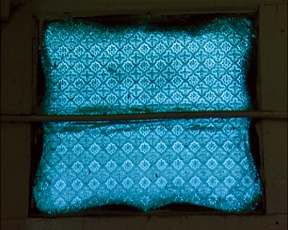The Lightning Testimonies
 INDIA / 2007 / English, Others / Color, B&W / Video / 113 min
INDIA / 2007 / English, Others / Color, B&W / Video / 113 min
Director: Amar Kanwar
Photography: Ranjan Palit
Editing: Sameera Jain
Sound: Suresh Rajamani
Assistant Director: Sandhya Kumar
Graphic Design: Sherna Dastur
Producer, Source: Amar Kanwar
The conflict that began with the partition of India and Pakistan in 1947 has perpetuated an unceasing saga of sexual violence against women. Through a wide range of film techniques, the film depicts the savagery of this violence, as well as the dignified and unyielding spirit of the women. Using meticulous research, the film explores how individuals and groups endured violence in different eras and social strata in India, how it became engraved in their memories, and how it was documented. In contrast to the indignation toward violence that is at the core of the work, the tranquil images finally lead to a space of quiet contemplation that lies beyond the suffering.
[Director’s Statement] This film remained in me for a long time before I actually began in 2005. During the anti-Muslim massacres in Gujarat, India in 2002, several incidents of sexual attacks on women occurred. We are all familiar with violence, but there was something odd about these attacks. There was a celebration that I couldn’t understand. What did it mean? I wanted to understand, but I didn’t know where and how to begin or even how to look, to listen or tell. Over time new questions emerged. Why is one image different from the other? Why does an image seem to contain many secrets? What could release them so as to suddenly connect with many unknown lives?
In a way the film reflects on the history of the Indian subcontinent but through the experiences of sexual violence in political conflicts. I tried to understand how such violence is resisted, remembered, and recorded by individuals and communities. Narratives hidden within a blue window or the weave of a cloth appeared, disappeared, and were reborn in another vocabulary. Multiple submerged narratives seemed to emerge, sometimes in people, images, and memories, and at other times in objects from nature and everyday life as silent but surviving witnesses. In all narratives the body became central—as a site for honor, hatred, and humiliation, and also for dignity and protest.
Somewhere, suddenly, while making the film, we moved across from the depths of suffering to a space of contemplation, resilience, and self-respect.
I could never have made such a film without the incredible support, affection, and skill of those who worked on the film and I feel deeply honored and grateful.
 Amar Kanwar
Amar Kanwar
Born in 1964, he lives and works in New Delhi. Recipient of the 1st Edvard Munch Award for Contemporary Art (Norway), Kanwar’s poetic and contemplative films explore the political, social, economic, and ecological conditions of the Indian subcontinent. A Season Outside (1997, screened at YIDFF ’99) examined issues of violence and nonviolence along the India-Pakistan border; it was awarded the Golden Conch at the Mumbai International Film Festival and the Golden Gate Award at the San Francisco International Film Festival. A Night Of Prophecy (2002, screened at YIDFF 2003) explored poetry in contemporary India. Torn First Pages (2003–08) is an investigation into the current situation in Burma. He has won many other awards at film festivals, and his films have been featured in special exhibitions at art museums, including the Stediljk Museum, Amsterdam; the Museum of Modern Art, New York; and the National Museum in Oslo, Norway. He also participated in Documenta 11 (2002) and 12 (2007) in Kassel, Germany. |
